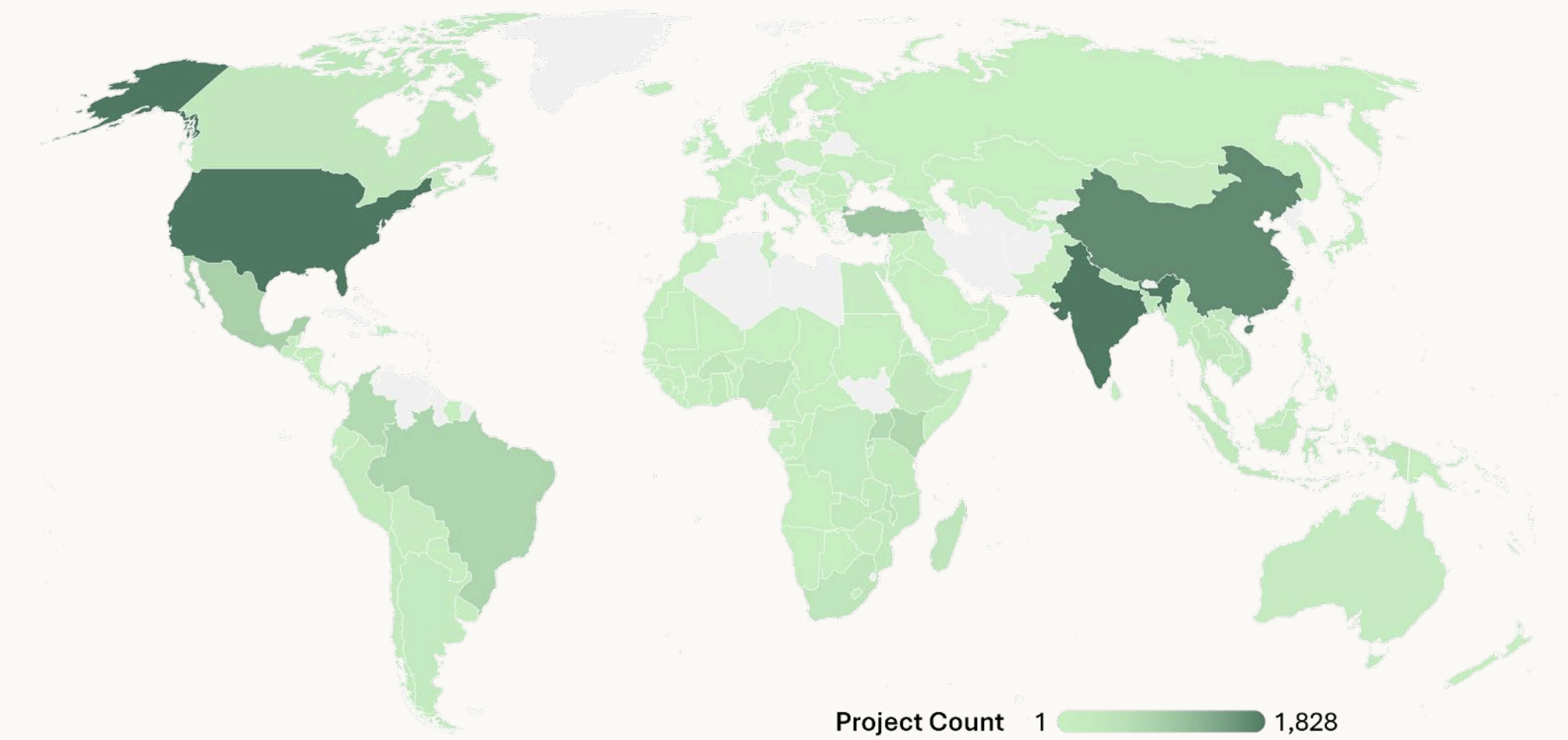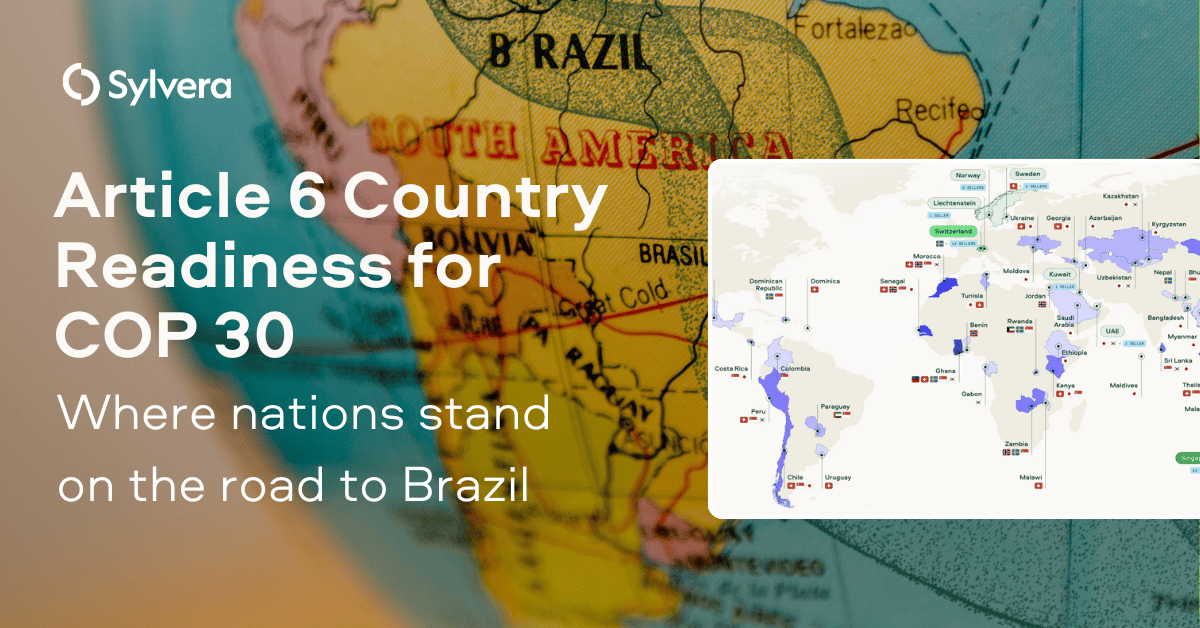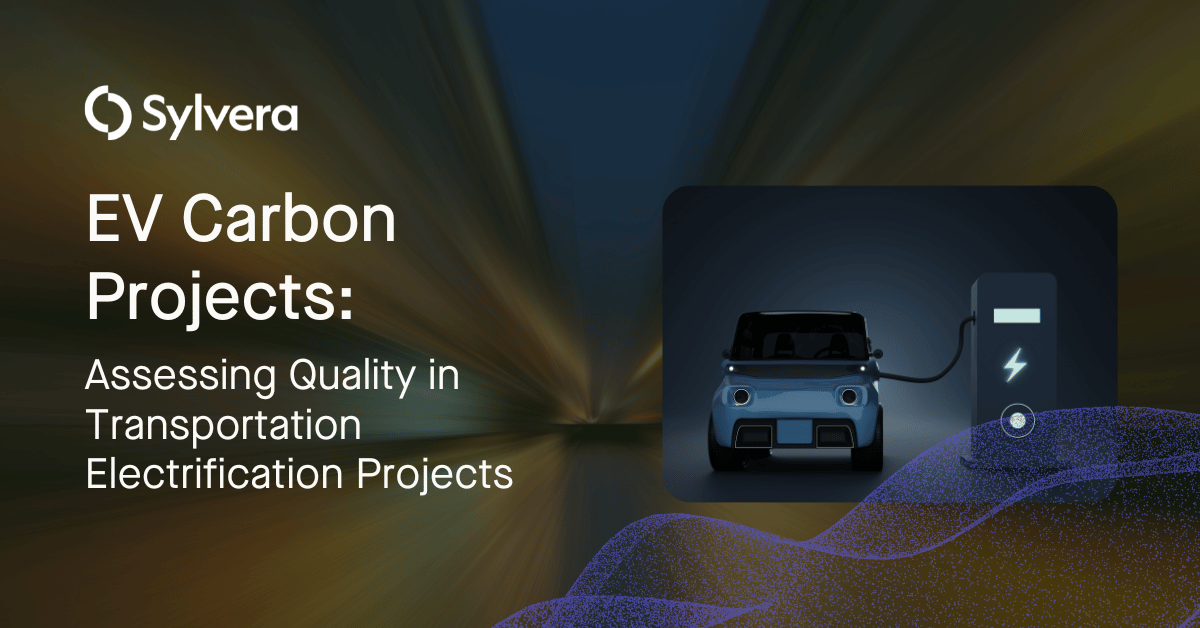「私たちは長年にわたり、信頼できる格付けの提供に注力し、現地データチームへの投資を重ねてきました。これにより当社の格付けの正確性は確保されていますが、購入者が検討している数千のプロジェクトにわたるスケールを実現することはできません。」
カーボンクレジット調達の最新動向について詳しくは、当社の記事「Key Takeaways for 2025」をご覧ください。調達戦略を改善するための、データに基づく5つのヒントをご紹介しています。

加えて:Connect to Supplyをご利用のお客様は、Sylveraのその他のツールもご利用いただけます。プロジェクトの格付け確認や強みの評価、高品質なカーボンクレジットの調達に加え、プロジェクトの進捗状況のモニタリング(特に発行前段階で投資している場合)も可能です。
Sylveraの無料デモを予約して、調達機能やレポーティング機能を体験しましょう。
気候変動枠組条約(UNFCCC)は1992年に設立され、現在198の締約国(うち195カ国)が2015年に パリ協定を採択しました。
2025年11月、第30回国連気候変動枠組条約締約国会議(通称COP30)がブラジルのベレンで開催されます。この会議では、気候変動の緩和とパリ協定の基準に対する各国の進捗状況に焦点が当てられます。
この記事では、これらの国のうち、6条運用開始の準備が最も整っているのはどの国かを検討します。
COP30への道:炭素市場にとって極めて重要な瞬間
国連気候変動枠組条約第30 回締約国会議(UNFCCC COP30)は2025年11月にブラジルで開催されます。
バクーで開催されたCOP29での画期的な合意により、第6条の残りのすべての構成要素が確定し、各国はパリ協定の下で国際炭素市場を運用するために必要な政治的、技術的な明確さを手に入れました。
世界各国政府が気候変動目標を計画し、革新的な資金調達メカニズムが必要とされる中、第6条は気候変動行動を加速させる大きな機会となります。しかし、成功の鍵はホスト国の準備態勢にあり、現在の進捗状況からは、いくつかの大きな隔たりがあることがわかります。
ブラジルがCOP30を主催することは、この準備態勢の評価に特に重要な意味を持ちます。広大な森林資源と再生可能エネルギーの可能性を持つホスト国として、ブラジル自身の第6条の軌跡は、世界の勢いに影響を与えるかもしれません。11月10日にアマゾン地域で会議が開かれるまでに、第6条の実質的な運用が達成されることは、国際的な炭素協力の強力な証明となるでしょう。
世界の第6条準備態勢の現状
第6条の運用化に向けて最も前進した国は?以下では、先進国と、多くの州政府が遅れをとっている分野に焦点を当てます。
リーディング・パック基準を設定する国々
少数の国々が第6条準備態勢のリーダーとして台頭し、包括的な準備が実際にどのようなものかを示しています。
ガーナは、おそらく最も先進的なホスト国として際立っており、第6条の活動を条件付きNDC措置に明確にリンクさせつつ、明確な肯定的活動リストと否定的活動リストを確立する詳細な国内枠組みを開発しました。ガーナのアプローチには、構造化された利益共有メカニズムが含まれており、スイスとの実施協定に基づき、すでに複数の認可書を発行しています。
カンボジアは、2025年4月にUNFCCCの初回報告書を提出し、環境省を主務官庁とする制度的な取り決めを明確に示すことで、最近リーダー層の仲間入りを果たしました。カンボジアの運営マニュアルには、包括的な6条プロセスが規定されており、承認された緩和成果の最大10%を国内利用のために留保するなど、革新的な利益配分規定が盛り込まれています。
タイは、実際のITMO取引を完了した最初の国となり、運用の成功を通じて異なる種類のリーダーシップを達成しました。2023年12月、タイはバンコクの電気バス・プログラムから1,916個のITMOをスイスに譲渡しました。これは世界初のITMO取引であり、その1年後にはさらに29,222個のITMOが譲渡されました。このような現実的な実施は、第6条メカニズムの現実的な実行可能性を示しています。
ケニアは、先進的な利益配分規制によって、土地ベースの 炭素プロジェクトでは純収益の少なくとも40%を地域社会の受益者に配分することを義務づけ、土地ベースでないプロジェクトでは25%を配分することを義務づけています。この枠組みは、地元コミュニティにとって強力なセーフガードと予測可能性を提供します。

エンゲージド・ミドル勢いをつける国々
より広範な約30カ国が二国間協定や覚書に調印し、第6条への参加に真剣な意向を示しています。注目すべき例は以下の通り:
- ルワンダと マダガスカルは、独立した基準で認証された炭素プロジェクトに対して、一方的に認可書を発行しています。
- ウガンダ、ガーナ、ミャンマー 、 バングラデシュは、複数のクリーン開発メカニズム活動を承認し、パリ協定のクレジット制度に移行しました。
- 国内コンプライアンス・カーボンプライシング制度にカーボンクレジット 受け入れを組み込んだインドネシア、コロンビア 、 チリ
課題:準備態勢における広範なギャップ
100カ国以上が国別決定貢献への関心を表明しているにもかかわらず、実際の準備態勢はまだ限定的です。UNFCCCの集中型算定・報告プラットフォーム(CARP)に初回報告書を提出したのはわずか9カ国であり、多くの国は第6条への参加に必要な基本的な制度が整っていません。
主な準備態勢のギャップは以下の通り:
制度的弱点:多くの国では、所轄官庁の指定や関係省庁間の明確な調整メカニズムがありません。このような基礎的な要素がなければ、各国は認可状を発行したり、国際取引を効果的に管理したりすることはできません。
インフラの不足:パリ協定の要件に沿った強固な監視・報告・検証(MRV)システムは、多くの潜在的ホスト国に存在しません。これは、環境の完全性と買い手の信頼に対する大きな障壁となります。
規制の不確実性:少なくとも6カ国が正式な第6条の枠組みを発表していますが、他の多くの国々は、 国際炭素市場参加のための明確な法的基盤なしに運営されています。
能力の制約:対応する調整の適用、レジストリの管理、透明性向上フレームワークの義務を果たすための技術的能力は、特に後発開発途上国にとって継続的な課題となっています。
ダウンロードホスト国の第6条準備:需要促進のための主要な側面詳細な国別評価、実施フレームワーク、COP30までに6条への取り組みを加速させるための行動指針をご覧ください。

COP30の必須条件:各国が達成すべきこと
各国は、COP30に向けて集中的に努力しなければなりません。また、戦略的な機会を活用することも必要です。以下、これらを検討します:
当面の優先事項
第6条への参加に真剣に取り組んでいる国々は、基礎となる準備態勢の要素に焦点を当てる必要があります:
- 初回報告書の提出残りの90カ国以上の参加国は、正式なUNFCCC報告書を提出し、参加要件を満たしていることを証明する必要があります。
- 制度的枠組みの確立:所管官庁を指定し、政府機関全体で明確な役割を定義することは、運用準備に不可欠です。
- 国内枠組みの構築:UNFCCCの要求事項を、ガーナやカンボジアなどの例に倣って、国内適用可能なルールやプロセスに変換することが必要です。
- 技術的能力の構築:パリ協定の要件に沿ったモニタリング、報告、検証システムへの投資。
戦略的機会
COP30への滑走路は、より高度なポジショニングの機会を与えてくれます:
- 試験的実施:タイの例に倣い、各国は運用能力を実証し、実務経験を積むためにパイロット活動を実施すべき。
- 二国間協定の発展:現在30ある二国間協定のネットワークをさらに拡大し、買い手と売り手のパートナーシップを増やします。
- 国内政策との統合:第6条の活動を国内の気候変動法、炭素価格制度、部門戦略と整合させること。
- ステークホルダーの参画:地域社会、市民社会、民間セクターの参加者間の支援構築。
遅れている多数派重要な介入策の必要性
まだ準備の初期段階にある国々にとって、COP30のタイムラインは緊急の行動を求めています:
- アフリカの後発開発途上国および小島嶼開発途上国は、的を絞った技術支援と能力開発支援を必要としています。
- 緩和の可能性が大きい主要新興国は、第6条の位置づけと規制のアプローチを明確にする必要があります。
- 自然の気候変動対策が豊富な国々には、森林・土地利用セクターの参加を促す 枠組みが必要
COP30ホスト国としてのブラジルの役割
COP30のホスト国として、ブラジルは第6条のリーダーシップを発揮するユニークなプレッシャーと機会に直面しています。
同国の広大な森林資源、再生可能エネルギーの可能性、既存の炭素市場の経験は、効果的な実施のためのショーケースとなる可能性を秘めています。
制度的取り決め、利益配分メカニズム、先住民の権利保護など、ブラジル自身の準備の軌跡は、おそらく第6条の実行可能性に関する世界の認識に影響を与えるでしょう。悲しいことに、ブラジルはすでに会議へのアプローチについて批判を受けています。
今年初め、ブラジル政府はCOP30への交通を緩和するため、何千エーカーものアマゾンの熱帯雨林を切り開く新しい4車線ハイウェイの建設を許可したことが明らかになり、ベレンにさらに5万人が押し寄せると予想されています(実際、市は新しいホテルを建設し、クルーズ船と契約することで、人の流入に備えています)。
ブラジル大統領は、この会議はアマゾンのニーズに光を当てるものだと述べていますが、批判的な人々は、森林伐採や高速道路が地域社会や生物多様性にどのような影響を与えるかについて心配しています。
高速道路は残念ですが、ブラジルの特殊な環境を考えれば、州政府が第6条の効果的なリーダーシップを発揮できることを期待しています。
自国の第6条の可能性を解き放て
COP30までの数週間は、各国が第6条の準備態勢を構築し、拡大する炭素市場の需要を取り込むための重要な機会となります。
州政府関係者、能力開発非政府組織、民間セクターの関係者のいずれであっても、現在の準備態勢のギャップとベストプラクティスを理解することは、参加に不可欠です。
第6条リスクをナビゲートする実用的な方法をお探しですか?Sylvera 利用して、様々な国のカーボンクレジット リスクプロファイルを評価し、対比してみてください。そして、業界をリードする発行前 格付け 格付け 活用して、気候変動目標を促進する高品質のクレジットを購入してください。
今すぐSylvera 無料デモをご請求いただき、当社のプラットフォームが御社の炭素クレジット市場での成功をどのように支援できるかをご確認ください。











